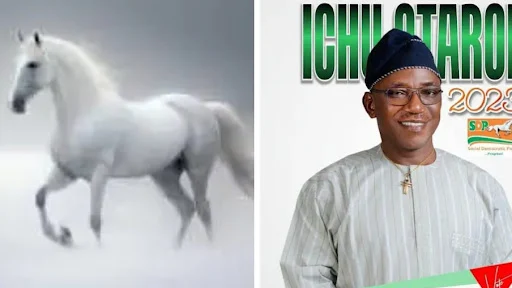By Mohammed Bello Doka
Former Minister of Youth and Sports, Solomon Dalung, has made a significant political move by aligning himself with the Social Democratic Party (SDP). In a recent Facebook post, Dalung signaled his defection from the ruling All Progressives Congress (APC) by sharing an image of himself alongside the SDP logo, strongly hinting at his membership in the party.
His announcement was laced with sharp criticism of Nigeria’s two dominant political parties. “The umbrella could not provide cover for the people, and instead of sweeping out corruption, the broom is sweeping in hunger, poverty, injustice, corruption, impunity, and kakistocracy,” Dalung wrote. He further hinted at a new hope for Nigeria, saying, “The white horse is the future, Nigeria shall rise again,” in clear reference to the SDP’s emblem.
Dalung’s move reflects a broader trend of political realignments as Nigeria approaches the 2027 general elections. His decision to pitch his tent with the SDP aligns with his long-standing advocacy for social justice and grassroots-oriented politics. However, while his defection has sparked conversations, the critical question remains: Does Dalung have the political weight to challenge the established order, particularly in Plateau State?
Historically, Plateau politics has been dominated by the PDP and APC, with deeply entrenched structures and loyal followings. Despite his prominence as a former minister and a vocal advocate for good governance, Dalung has never wielded significant electoral influence in Plateau. His previous attempts at political office have not translated into major electoral victories, raising doubts about his ability to upend the current political dynamics in the state.
Moreover, SDP, while a historically relevant party, lacks the extensive grassroots presence required to challenge the dominance of the major political players in Plateau. Even with Dalung’s entry, it remains uncertain whether the party can muster enough momentum to pose a serious threat to the ruling establishment.
Dalung’s defection, however, is not without significance. It signals growing discontent within the APC and could contribute to the fragmentation of its support base. Whether this translates into a viable political movement or merely a symbolic protest against the status quo will depend on how effectively he can mobilize support beyond social media rhetoric.
For now, while Dalung’s SDP alignment has injected fresh discourse into Nigeria’s political landscape, the road to political relevance in Plateau remains steep. Whether he can turn his defection into a genuine electoral force is a question only time—and the people of Plateau—can answer.

